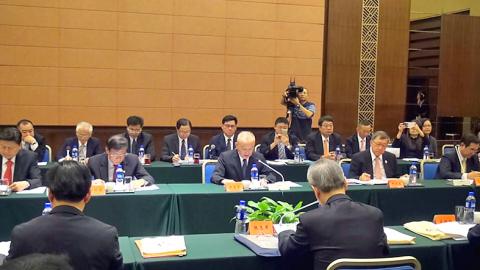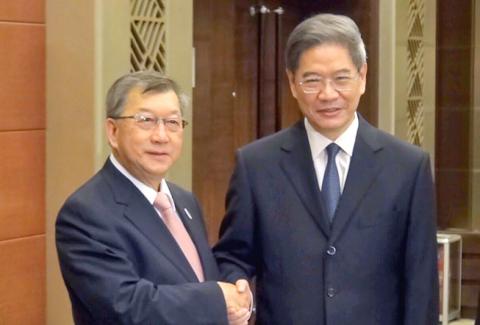Setting preconditions for cross-strait exchanges are not conducive to “meaningful dialogue,” Presidential Office spokesperson Alex Huang (黃重諺) said yesterday.
“Preconditions are not necessary for meaningful dialogue; only those [without preconditions] can facilitate genuine understanding between the two sides. Maintaining peace and stability across the Strait is the responsibility of both sides, and the Presidential Office believes that any initiative that improves mutual understanding is a worthy and positive effort,” Huang said.
Huang’s remark was in response to comments made yesterday by China’s Taiwan Affairs Office (TAO) Minister Zhang Zhijun (張志軍), who said that as long as the political foundation of the so-called “1992 consensus” remains solid, cross-strait exchanges can still be pushed forward.

Photo: CNA
The “1992 consensus” — a term former Mainland Affairs Council chairman Su Chi (蘇起) admitted to making up in 2000 — refers to a supposed understanding reached during cross-strait talks in 1992 that both Taiwan and China acknowledge that there is “one China,” with each side having its own interpretation of what “China” means.
President Tsai Ing-wen (蔡英文) and the Democratic Progressive Party (DPP) have never recognized the existence of such an agreement. China consequently cut off official channels of communication with Taiwan after Tsai was sworn in as president on May 20.
A Taiwanese delegation, comprised of Chinese Nationalist Party (KMT) and independent heads of local governments or their deputies, on Saturday arrived in Beijing and met with Zhang and Chinese People’s Political Consultative Conference chairman Yu Zhengsheng (俞正聲) ostensibly to discuss tourism and trade-related issues. The delegation, whose members include Hsinchu Commissioner Chiu Ching-chun (邱鏡淳), Miaoli Commissioner Hsu Yao-chang (徐耀昌), Hualien Commissioner Fu Kun-chi (傅崑萁), Lienchiang Commissioner Liu Tseng-ying (劉增應), New Taipei City Deputy Mayor Yeh Hui-ching (葉惠青), Taitung County Deputy Commissioner Chen Chin-hu (陳金虎) and Kinmen Deputy Commissioner Wu Cheng-tien (吳成典), called for both sides of the Strait to choose a “broad avenue” on which cross-strait economic, tourism, cultural and agricultural cooperation can be continued.

Photo: CNA
Zhang said the Taiwanese delegation is visiting China because local government heads are “disturbed” by the “severe impact” on cross-strait relations that arose from “changes in Taiwan’s political situation following May 20.”
The delegates “recognize the 1992 consensus and support peaceful development,” Zhang said, adding that the attendees have agreed “to insist on the 1992 consensus as a common political foundation, regardless of changes in the situation.”
“City-to-city exchanges are to continue under the precondition that the Taiwanese local governmental heads support the 1992 consensus,” he said.
National Taiwan University professor of political science Fan Shih-ping (范世平) said that by holding the meeting, Beijing runs the risk of tacitly admitting that Chinese tourists are a tool of united front political warfare, while calling into question the meeting’s ability to change the overall cross-strait conditions in any meaningful way.
“It seems that the TAO is doing busy work to fill quotas for the benefit of its higher-ups,” he said.
It is inappropriate for county commissioners and city mayors to visit Beijing at a time when they should be providing disaster relief to their constituents after the typhoons last week, DPP Legislator Cheng Yun-peng (鄭運鵬) said, adding that Beijing’s attempt to divide Taiwan’s local governments would lead to “backlash from residents of other counties and cities.”
A senior official involved in cross-strait affairs speaking on the condition of anonymity said that Beijing is believed to regard the delegation as little more than tool for “1992 consensus” propaganda and the delegates are unlikely to wring any concrete guarantees from China.
Additional reporting by CNA

MAKING WAVES: China’s maritime militia could become a nontraditional threat in war, clogging up shipping lanes to prevent US or Japanese intervention, a report said About 1,900 Chinese ships flying flags of convenience and fishing vessels that participated in China’s military exercises around Taiwan last month and in January have been listed for monitoring, Coast Guard Administration (CGA) Deputy Director-General Hsieh Ching-chin (謝慶欽) said yesterday. Following amendments to the Commercial Port Act (商港法) and the Law of Ships (船舶法) last month, the CGA can designate possible berthing areas or deny ports of call for vessels suspected of loitering around areas where undersea cables can be accessed, Oceans Affairs Council Minister Kuan Bi-ling (管碧玲) said. The list of suspected ships, originally 300, had risen to about 1,900 as

Japan’s strategic alliance with the US would collapse if Tokyo were to turn away from a conflict in Taiwan, Japanese Prime Minister Sanae Takaichi said yesterday, but distanced herself from previous comments that suggested a possible military response in such an event. Takaichi expressed her latest views on a nationally broadcast TV program late on Monday, where an opposition party leader criticized her for igniting tensions with China with the earlier remarks. Ties between Japan and China have sunk to the worst level in years after Takaichi said in November that a hypothetical Chinese attack on Taiwan could bring about a Japanese

MORE RESPONSIBILITY: Draftees would be expected to fight alongside professional soldiers, likely requiring the transformation of some training brigades into combat units The armed forces are to start incorporating new conscripts into combined arms brigades this year to enhance combat readiness, the Executive Yuan’s latest policy report said. The new policy would affect Taiwanese men entering the military for their compulsory service, which was extended to one year under reforms by then-president Tsai Ing-wen (蔡英文) in 2022. The conscripts would be trained to operate machine guns, uncrewed aerial vehicles, anti-tank guided missile launchers and Stinger air defense systems, the report said, adding that the basic training would be lengthened to eight weeks. After basic training, conscripts would be sorted into infantry battalions that would take

DEEP-STRIKE CAPABILITY: The scenario simulated a PLA drill that turned into an assault on Taiwan’s critical infrastructure, with the launchers providing fire support Taiwan yesterday conducted this year’s first military exercises at Longsiang Base in Taichung, demonstrating the newly acquired High Mobility Artillery Rocket System’s (HIMARS) ability to provide fire support and deep-strike capabilities. The scenario simulated an attack on Penghu County, with HIMARS trucks immediately rolling into designated launch areas and firing barrages at the Wangan (望安) and Cimei (七美) islands, simulating the provision of fire support against invading forces. The HIMARS are supposed to “fire and leave,” which would significantly increase personnel and equipment survivability, a military official said. The drill simulated an exercise launched by the Chinese People’s Liberation Army (PLA) Eastern